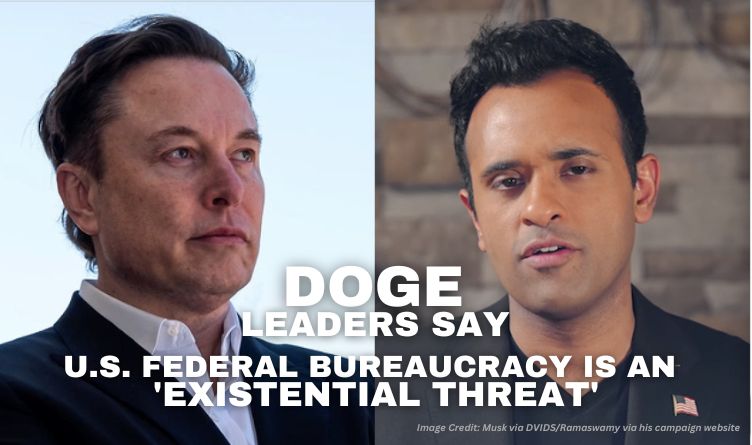Image: Elon Musk & Vivek Ramaswamy Image Credit: Musk via DVIDS/Ramaswamy via his campaign website
The Center Square [By Brett Rowland] –
Tesla CEO Elon Musk and entrepreneur Vivek Ramaswamy laid out their plans Wednesday for President-elect Donald Trump’s new Department of Government Efficiency.
The pair wrote in an op-ed published in The Wall Street Journal that federal bureaucracy is an “existential threat” to the nation.
“The entrenched and ever-growing bureaucracy represents an existential threat to our republic, and politicians have abetted it for too long,” they wrote. “That’s why we’re doing things differently. We are entrepreneurs, not politicians. We will serve as outside volunteers, not federal officials or employees. Unlike government commissions or advisory committees, we won’t just write reports or cut ribbons. We’ll cut costs.”

Trump previously assigned big goals to DOGE. He said the new group will allow his administration to “dismantle government bureaucracy, slash excess regulation, cut wasteful expenditures, and restructure federal agencies.” Trump also said DOGE could bring sweeping changes.
“It will become, potentially, ‘The Manhatten Project,’ of our time,” Trump’s announcement said. “Republican politicians have dreamed about the objectives of ‘DOGE’ for a very long time.”
The original Manhatten Project was a research and development project during the second World War that led to the creation of nuclear weapons.
Musk and Ramaswamy said they don’t plan to work with Congress.
“The two of us will advise DOGE at every step to pursue three major kinds of reform: regulatory rescissions, administrative reductions and cost savings,” they wrote. “We will focus particularly on driving change through executive action based on existing legislation rather than by passing new laws.”
Instead, they plan to work closely with the White House Office of Management and Budget, which oversees the implementation of the president’s vision for the country.
Musk and Ramaswamy said they will be guided by the U.S. Constitution and two recent U.S. Supreme Court decisions.
“In West Virginia v. Environmental Protection Agency (2022), the justices held that agencies can’t impose regulations dealing with major economic or policy questions unless Congress specifically authorizes them to do so,” they wrote. “In Loper Bright v. Raimondo (2024), the court overturned the Chevron doctrine and held that federal courts should no longer defer to federal agencies’ interpretations of the law or their own rulemaking authority. Together, these cases suggest that a plethora of current federal regulations exceed the authority Congress has granted under the law.”
The DOGE leaders said they’re also prepared for criticism.
“When the president nullifies thousands of such regulations, critics will allege executive overreach,” they wrote. “In fact, it will be correcting the executive overreach of thousands of regulations promulgated by administrative fiat that were never authorized by Congress.”
They also took at aim at those who say they won’t be successful where other commissions and government efforts have failed.
“Critics claim that we can’t meaningfully close the federal deficit without taking aim at entitlement programs like Medicare and Medicaid, which require Congress to shrink,” they wrote. “But this deflects attention from the sheer magnitude of waste, fraud and abuse that nearly all taxpayers wish to end – and that DOGE aims to address by identifying pinpoint executive actions that would result in immediate savings for taxpayers.”

They also outlined early plans for cuts.
“DOGE will help end federal overspending by taking aim at the $500 billion plus in annual federal expenditures that are unauthorized by Congress or being used in ways that Congress never intended, from $535 million a year to the Corporation for Public Broadcasting and $1.5 billion for grants to international organizations to nearly $300 million to progressive groups like Planned Parenthood,” they wrote.
Even military spending could be on the chopping block.
“The Pentagon recently failed its seventh consecutive audit, suggesting that the agency’s leadership has little idea how its annual budget of more than $800 billion is spent,” they wrote.
The U.S. Department of Defense’s annual audit once again resulted in a disclaimer opinion. That means the federal government’s largest agency – with a budget of more than $840 billion – can’t fully explain its spending. The disclaimer this year was expected. And it’s expected again next year. The Pentagon previously said it will be able to accurately account for its spending by 2027.




2 Responses
They’re 100% right.
Imagine destroying the bureaucracy with a department named after a meme. This world just keeps getting better.